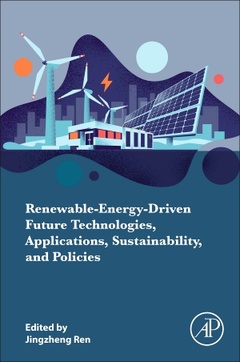Renewable-Energy-Driven Future Technologies, Modelling, Applications, Sustainability and Policies
Coordonnateur : Ren Jingzheng

Part I: Technologies 1. Solar energy technologies: principles and applications 2. Bioenergy for better sustainability: technologies, challenges and prospects 3. Organic Rankine cycle driven by geothermal heat source: life cycle techno-economic-environmental analysis 4. Renewable energy based trigeneration systems — technologies, challenges and opportunities 5. Integrated power transmission and distribution systems
Part II: Modelling 6. Integrated inexact optimization for hybrid renewable energy systems 7. Large-scale integration of variable renewable resources 8. The climate and economic benefits of developing renewable energy in China
Part III: Applications 9. The utilization of renewable energy for low-carbon buildings 10. Towards a renewable-energy-driven district heating system: key technology, system design and integrated planning 11. Renewable-energy-driven desalination for more water and less carbon
Part IV: Sustainability 12. The environmental performance of hydrogen production pathways based on renewable sources 13. Integrated economic-environmental-social assessment of straw for bioenergy production 14. Sustainability assessment of renewable-energy based hydrogen and ammonia pathways 15. An extended fuzzy divergence measure-based technique for order preference by similarity to ideal solution method for renewable energy investments 16. Multicriteria decision making for the selection of the best renewable energy scenario based on fuzzy inference system
Part V: Policy 17. How much is possible? An integrative study of intermittent and renewables sources deployment. A case study in Brazil 18. Renewable energy technologies: barriers and policy implications 19. Policies for a sustainable energy future: how do renewable energy subsidies work and how can they be improved? 20. Renewable energy-based power generation and the contribution to economic growth: the case of Portugal
Renewable researchers, academics, engineers
Solar/wind power system designer and installers and policy-makers
- Presents the advanced renewable-energy-driven technologies and the innovative applications of renewable energy sources
- Develops the models for the efficient use of renewable energy, decision-making and the investigation of its climate and economic benefits
- Investigates the sustainability of renewable energy systems
- Features the regulations and policies of renewable energy
Date de parution : 09-2020
Ouvrage de 636 p.
15x22.8 cm
Thème de Renewable-Energy-Driven Future :
Mots-clés :
Air pollution; Ammonia; Barriers; Bioalcohols; Bioenergy; Biogas; Brine waste; Building delivery systems; CO2 emission; CO2 emissions; Carbon footprint analysis; Challenges; China; Cointegration; Cost-benefit analysis; DER management problem; Deployment; Desalination; District heating; Divergence measure; Economic growth; Electrolysis; Energy efficiency; Energy potential; Energy storage; Entropy; Environmental benefit; Exergoeconomic analysis; Feed-in tariff; Feedstock; Fermentation; Financial crisis; Fuzzy inference; Fuzzy set; Fuzzy theory; GDP; GHG abatement; Gasification; Geothermal heat source; Greenhouse gas emissions; Hybrid renewable energy systems; Hydro; Hydrogen; IMED/CGE model; In situ removal; Independent System Operators; Industrial development; Integrated inexact optimization; Integrated transmission and distribution system; Intermittent renewable resources; Investment; Life cycle assessment; Life-cycle assessment; Limits; Low-carbon building; MILP; Membrane; Multicriteria decision-making; Net-zero energy building; Opportunities; Optimization; Organic Rankine cycle; PV technologies; Photoelectrochemical; Photovoltaic; Portugal; Power system; Power system planning; Renewable; Renewable energy; Renewable energy technology; Renewable energy-based trigeneration; Renewable power; Renewable support mechanisms; Renewables; Socioeconomic benefit; Solar; Solar collectors; Solar cooking; Solar cooling technologies; Solar desalination; Solar pond; Stakeholders; Stochastic programming; Straw; Structural breaks; Subsidies; Sustainability; Sustainable development; TOPSIS; Thermal storage; Thermally activated cooling; Thermoeconomic analysis; Trigeneration; Uncertainty; Unit commitment problem; Urban planning; Variable renewable energies; Variable renewable power; Waste heat



